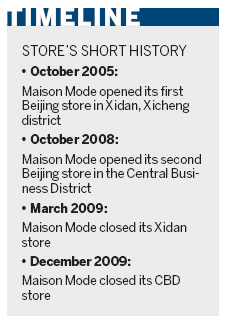
'Dated business model' and 'bad location' blamed
Maison Mode is now little more than a memory among the high-end department stores in Beijing, after a period of business in which it failed to nail the market. METRO decided to find out what went wrong.
The department store shut up shop on the last day of 2009 at its last surviving Beijing location - in the CBD - just over one year after it opened in October 2008. It had already closed its first store in Xidan in March 2009. The retreat was extensive with more stores also shut in Shanghai and Xian. Only those in second-tier cities remained, such as Changsha, Chengdu, Shenyang, Chongqing and Urumqi.
According to a receptionist at the Walton Brown Group, the parent company of Maison Mode, the main reason was that "the property owner stopped continuing its lease with Maison Mode." She didn't reveal whether they would open more stores elsewhere.

Maison Mode is one of four major brands under the Walton Brown Group, based in Hong Kong, and entered Beijing in 2005. Its first store was in Xidan Times Plaza.
Guo Zengli, director of the information center of China shopping center industry, said the failure of Maison Mode was due to its location. He said Xidan is a shopping area for young people, but Maison Mode's target customers were older people with high purchasing power.
"Additionally, the brand name is not very famous, making it hard to compete with other big shopping malls nearby," he said.
He said department stores only targeting high-end consumers in Beijing will always have trouble surviving.
Some local shoppers agreed with the expert opinion.
"I went there once when I was going for a movie," said Wu Xinmin, a civil servant in Beijing.
"My only impression was that there were too few customers; I guess its location was part of the problem because most shopping malls are located in the north of Chang'an Avenue, while this one is in the south," he said.
Wang Yuan, a reporter in her 20s, says she buys big brand bags and sunglasses occasionally. She is also a regular visitor of Shin Kong Place, a high-end shopping mall in CBD. Wang said she had never heard of Maison Mode. The name even passed her by as a student in Shanghai, the home city of the earliest Maison Mode store in the mainland.
Compared to other shopping malls nearby like Shin Kong Place, Maison Mode typically had fewer promotions and events. Wang Zhongyuan, a frequent visitor of high-end malls in Beijing, said he had stayed in Beijing for more than six years but also never heard of the store.
"There are limited customers for luxury consumption, so businesses targeting at this group are competing for a limited consumer base," said Lai Yang, general secretary of Beijing Institute of Business Economics. "If they don't have effective promotions, they can't attract customers."
Besides the problems of bad location and few promotions, Maison Mode is also being blamed for having an outdated business model. Like a traditional department store, it distributes space to different shops and then charges rent.
This was a trend of the early 1990s when the first batch of high-end brands swarmed into China. The model was considered a good way for brands to deal with tax, finance, and store decoration, but quickly became unattractive when the market opened up.
Guo told METRO that well-known brands like LV and Gucci prefer the freedom to display their products wherever they like. However, this was a problem with Maison Mode because all the space was strictly assigned.
"In Shin Kong Place, the display space for LV can reach up to 1,800 sq ms, which is hard for Maison Mode to accommodate," Guo said.